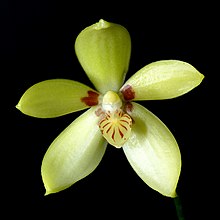| Phalaenopsis cochlearis | |
|---|---|

| |
| Flower detail | |
| Scientific classification | |
| Kingdom: | Plantae |
| Clade: | Tracheophytes |
| Clade: | Angiosperms |
| Clade: | Monocots |
| Order: | Asparagales |
| Family: | Orchidaceae |
| Subfamily: | Epidendroideae |
| Genus: | Phalaenopsis |
| Species: | P. cochlearis |
| Binomial name | |
| Phalaenopsis cochlearis Holttum | |
| Synonyms | |
| |
Phalaenopsis cochlearis is a species of orchid native to peninsular Malaysia to Borneo.
Description
These lithophytic or epiphytic herbs have oblong-elliptic to elliptic-obovate, subacute, up to 22 cm long and 8 cm wide, distichously arranged leaves. Many pale yellow, glossy flowers are produced on panicles up to 50 cm in length. The peduncle of the inflorescence is erect, but the branches are arching to subpendent. The species occurs at elevations of 500-700 m a.s.l. The specific epithet cochlearis is derived from Latin, meaning "concave like a spoon", which refers to the morphology of the labellum.
Conservation
This species is protected unter the CITES appendix II regulations of international trade. The species is regarded as critically endangered and illegal collecting is a problem in their habitat. It is threatened by small-scale logging, quarrying, land clearance for traditional farming and collecting for trade. Locals collect wild plants and sell them to nurseries, which ultimately export plants to the US, Japan and Europe. Ex-situ conservation through artificial propagation would be beneficial.
References
- ^ "Phalaenopsis cochlearis". Plants of the World Online. Royal Botanic Gardens, Kew. Retrieved 25 February 2022.
- Christenson, E. A. (2001). Phalaenopsis: a monograph. Timber Press (OR).
- "Phalaenopsis". CITES.
- Rusea, G., Lim, M. Y. L., Phoon, S. N., Yong, W. S. Y., Tang, C. H., Khor, H. E., ... & Abdullah, J. (2009). Malaysian limestone orchids status: diversity, threat and conservation. Blumea-Biodiversity, Evolution and Biogeography of Plants, 54(1-2), 109-116.
| Taxon identifiers | |
|---|---|
| Phalaenopsis cochlearis |
|
This Phalaenopsis-related article is a stub. You can help Misplaced Pages by expanding it. |